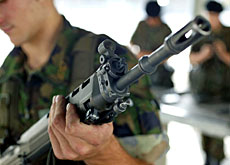Police bank on European database

Swiss police forces and border guards have come out in favour of closer security and asylum cooperation with the European Union.
They say the Schengen accord, the subject of a nationwide vote on June 5, would give them access to a common information system to combat crime.
Heinz Buttauer, the president of the Swiss Federation of Police Officers, can be seen in numerous advertisements in the country’s newspapers encouraging people to vote yes in June.
Buttauer is in good company as many police officers and heads of police in the country’s cantons have called on voters to approve the accord.
One of the reasons for promoting closer security ties with the EU is access to the Schengen Information System (SIS).
This computer database, with its central server in Strasbourg, France, lists suspects or objects linked to a suspected crime.
And it takes only minutes to issue a search warrant in the Schengen member countries.
Norway
“Norway’s police for instance successfully tracked down the suspected murderer of a policeman,” said Jean-Pierre Monti, the federation’s secretary-general.
“The details of the suspect had been fed into the SIS and a man was arrested within weeks in Spain.”
Supporters of the Schengen accord in Switzerland like to use Norway as an example because the Scandinavian country is – like the Swiss – not a member of the EU.
According to the Swiss authorities, the SIS is a great tool, which allows information to be passed on and accessed across Europe at the touch of a button.
“In today’s world, it is impossible to combat crime efficiently without close cooperation between security forces both in Switzerland and beyond its borders,” officials from the foreign and justice ministries said in a joint statement.
Asylum database
As part of the security cooperation between member countries, border guards can use the shared information to check people applying for asylum.
Under another EU agreement, the Dublin accord, the authorities can refuse to consider an asylum request if a person has handed in a similar application in another member country.
Linked to the SIS is the Eurodac database, which contains fingerprints of asylum seekers in member countries.
This allows the police to identify people without personal documents or those trying to abuse the asylum system.
Officials say one in five requests in Switzerland is made by somebody who has already applied for asylum in another European country.
SIS would also give Switzerland access to VIS, a visa database for the currently 15 countries which are in the Schengen zone.
Hole vs data protection
For Monti, access to the SIS is vital for the Swiss police.
“If we were the only country to remain outside it, Switzerland risks being the hole in a Europe-wide security network, thus attracting virtually all the criminals,” he said.
Monti warned that the information system was a serious tool, into which 11,000 items of new data were fed everyday.
“The SIS is not a toy with information to play around with. It only stores details about serious cases, not just petty crime such as traffic fines or shoplifting,” he said.
But not everyone believes that SIS is a wonder tool – scepticism reigns among the members of Switzerland’s security forces.
Jacques Strahm, a regional commander of the border guards in western Switzerland, fears that the Schengen/Dublin agreements will put pressure on the country to fall into line with other regulations in EU countries.
He acknowledged that Switzerland had achieved the best possible results so far in its negotiations with the EU.
Doubts
But Strahm doubts whether Schengen will actually lead to improved security.
“You cannot fight organised criminal gangs without the SIS. But it is a lie to say that Schengen will not lead to an increase in petty crime in Switzerland,” he added.
And some police and border guards have come out against the Schengen agreement as a whole.
On May 13 a group calling themselves “Police against Schengen/Border Guards against Schengen” said they disagreed with the pro-treaty stance of the Swiss Federation of Police Officers.
They accused the federation of giving out “false information” that all police officers supported the treaty.
swissinfo, Philippe Kropf
Switzerland shares 1,881km of borders with Germany, France, Italy and Austria.
600,000 people cross the Swiss borders every day.
The Swiss border guard unit has 2,000 members.
Membership of the SIS would cost Switzerland SFr22 million ($18.6 million).
13 EU countries, Norway and Iceland have access to the Schengen Information System (SIS).
Britain and the Irish Republic are due to join later this year.
The ten new EU countries will gradually become members of an updated SIS from next year.
The information system lists more than 11 million entries.
Most people registered in the system are rejected asylum seekers.
About one million data entries relate to people considered a security risk.

In compliance with the JTI standards
More: SWI swissinfo.ch certified by the Journalism Trust Initiative



You can find an overview of ongoing debates with our journalists here. Please join us!
If you want to start a conversation about a topic raised in this article or want to report factual errors, email us at english@swissinfo.ch.